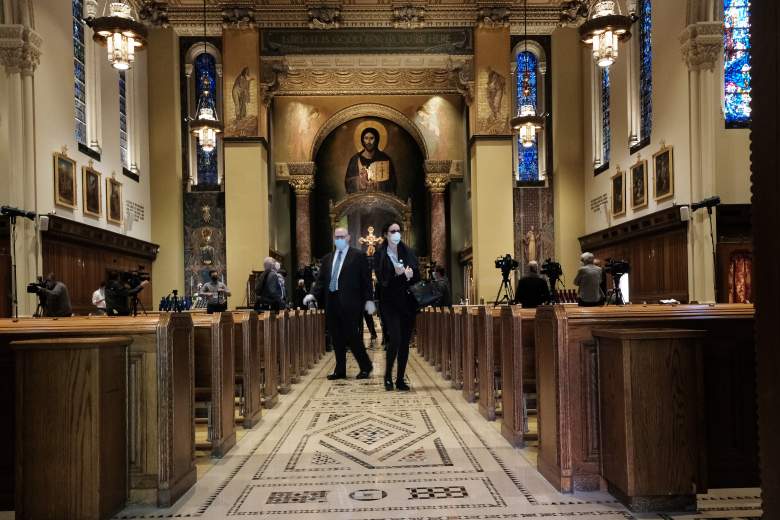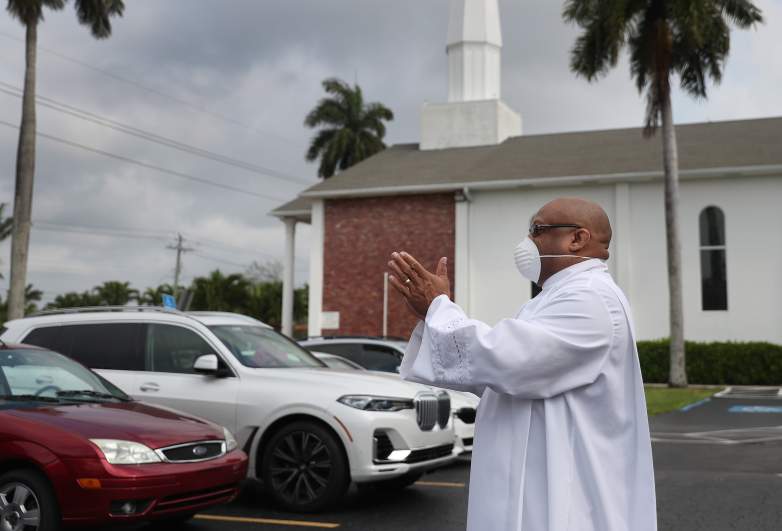
Getty People attend a press conference with the Archbishop of New York, Cardinal Timothy Dolan, at Our Saviour Parish in Manhattan regarding the reopening of churches in the archdiocese amid the coronavirus pandemic on May 21, 2020 in New York City. Dolan, who was joined by other faith leaders at the news conference, outlined preparations for the gradual reopening of 288 churches in the New York City area. Some of the changes at churches will include no distribution of Holy Communion, a distribution of masks, the regular regularly disinfection of pews and signage at entrance doors instructing anyone with fever or flu-like symptoms not to enter the church. Maximum occupancy will be 25% of capacity and hand sanitizer will be available at the entrance of the church.
President Trump today announced that he has directed the Centers for Disease Control and Prevention to include houses of worship as an essential service.
In a press briefing he said:
Today I’m identifying houses of worship, churches, synagogue, and mosques as essential places that provide essential services. Some governors have deemed liquor stores and abortion clinics as essential but have left out churches and other houses of worship. It’s not right. So I’m correcting this injustice and calling Houses of Worship Essential.
The president said he’s calling on governors to allow places of worship “to open right now.”
“These are places that hold our society together and keep our people united,” Trump said, adding that people are demanding to go to church, synagogue, and mosques.
He said if governors do not want to deem houses of worship essential in their states, “I will override the governors.”
“In America we need more prayers, not less,” Trump said.
You can watch President Trump’s announcement here:
President Trump Said Religious Leaders Will ‘Make Sure’ Their Congregations are Safe

GettyRev. Dr. Robert Griffin greets parishioners as they arrive for an Easter service in the parking lot of the Sunshine Cathedral on April 12, 2020 in Fort Lauderdale, Florida. Members of the congregation met in the parking lot and watched a Facebook Live streaming of the service taking part in the cathedral.
Community- and faith-based organizations are important in helping slow the spread of coronavirus according to the Centers for Disease Control and Prevention, who has laid out interim guidance for faith leaders.
Their new guidance has yet to be published, but under President Trump’s orders today it seems as though he is leaving it up to those leaders to figure out how to hold services while also keeping religious followers safe amid the coronavirus pandemic.
Trump said:
Many millions of Americans embrace worship as an essential part of life. The ministers, pastors, rabbis, Imams and other faith leaders will make sure that their congregations are safe as they gather and pray. I know them well. They love their congregations. They love their people. They don’t want anything bad to happen to them or to anybody else.
President Trump Does Not Have the Power to Override Governors on This Issue
During the President’s announcement Friday he said that if governors have a problem reopening their houses of worship they can give him a call, but they won’t get far.
Jonathan Turley, Shapiro Professor of Public Interest Law at George Washington University, columnist, and legal analyst for CBS and BBC News tweeted that the President does not possess the power to allow houses of worship to open if governors oppose it, saying in a thread to the original tweet, “there is not a hope or a prayer for such presidential mandates to force the opening of churches.”
In a column Turley wrote in April, he said, “After leaving it to governors to implement various stay-at-home orders, Trump is now asserting the unilateral authority to lift such state orders. He’s wrong. Our Constitution was written precisely to deny that particular claim.”
However, there could be workarounds. In the second part of Turley’s tweet he wrote, “What the Administration can do is to join in challenges to overbroad orders under the federal constitution. That is precisely what Attorney General Barr is doing.”
A constitutional law expert and professor at Cooley law, Brendon Beery, told Heavy in an email, “The President’s job under Article II is to execute law, not make it.”
According to Beery, there are a few questions to answer regarding whether Trump could actually override governors:
1) Is there some statute Trump is claiming to execute here? 2) If there is a statute, does it exceed Congress’s authority by invading states’ police power? 3) If the statute is valid, is Trump going beyond the letter and spirit of the statute in violation of his Article II duty to execute the law? And 4) Can any federal law relating to health and safety preempt a state’s policy that involves the quintessential state function of protecting the health and welfare of the population?
“My guess is that, as usual, Trump has an understanding of his own authority that goes well beyond constitutional norms,” Beery said.
READ NEXT: 9-Year-Old Boy Found Dead 11 Hours After Amber Alert Issued